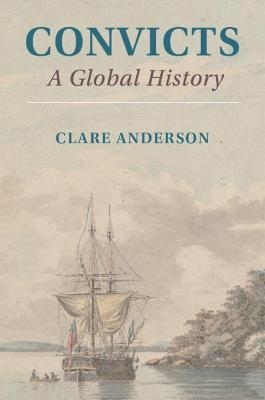
Convicts
A Global History
Seiten
2022
Cambridge University Press (Verlag)
978-1-108-81494-2 (ISBN)
Cambridge University Press (Verlag)
978-1-108-81494-2 (ISBN)
A radical new global reading of histories of empire and nation, showing that the history of punishment is not solely connected to the emergence of prisons and penitentiaries, but to histories of governance, occupation and global connections across the world.
Clare Anderson provides a radical new reading of histories of empire and nation, showing that the history of punishment is not connected solely to the emergence of prisons and penitentiaries, but to histories of governance, occupation, and global connections across the world. Exploring punitive mobility to islands, colonies, and remote inland and border regions over a period of five centuries, she proposes a close and enduring connection between punishment, governance, repression, and nation and empire building, and reveals how states, imperial powers, and trading companies used convicts to satisfy various geo-political and social ambitions. Punitive mobility became intertwined with other forms of labour bondage, including enslavement, with convicts a key source of unfree labour that could be used to occupy territories. Far from passive subjects, however, convicts manifested their agency in various forms, including the extension of political ideology and cultural transfer, and vital contributions to contemporary knowledge production.
Clare Anderson provides a radical new reading of histories of empire and nation, showing that the history of punishment is not connected solely to the emergence of prisons and penitentiaries, but to histories of governance, occupation, and global connections across the world. Exploring punitive mobility to islands, colonies, and remote inland and border regions over a period of five centuries, she proposes a close and enduring connection between punishment, governance, repression, and nation and empire building, and reveals how states, imperial powers, and trading companies used convicts to satisfy various geo-political and social ambitions. Punitive mobility became intertwined with other forms of labour bondage, including enslavement, with convicts a key source of unfree labour that could be used to occupy territories. Far from passive subjects, however, convicts manifested their agency in various forms, including the extension of political ideology and cultural transfer, and vital contributions to contemporary knowledge production.
Clare Anderson is Professor of History at the University of Leicester.
1. Introduction: a British expedition to the Brazilian penal colony of Fernando de Noronha in 1887. Part I: 2. Empires and colonies; 3. Nations, borders, and islands; 4. Enslavement, banishment, and penal transportation; 5. Imperial governance; 6. Insurgency, politics, and religion; Part II: 7. Punishment and penal systems; 8. Encounters, exploration, and knowledge; 9. Medicine, criminality, and race; 10. The human sciences; 11. Escape and extradition; 12. Conclusion; Index.
| Erscheinungsdatum | 10.01.2022 |
|---|---|
| Zusatzinfo | Worked examples or Exercises |
| Verlagsort | Cambridge |
| Sprache | englisch |
| Maße | 151 x 230 mm |
| Gewicht | 720 g |
| Themenwelt | Geisteswissenschaften ► Geschichte ► Allgemeine Geschichte |
| Geschichte ► Teilgebiete der Geschichte ► Kulturgeschichte | |
| Recht / Steuern ► EU / Internationales Recht | |
| Recht / Steuern ► Strafrecht ► Kriminologie | |
| Recht / Steuern ► Strafrecht ► Strafverfahrensrecht | |
| Sozialwissenschaften ► Soziologie | |
| ISBN-10 | 1-108-81494-8 / 1108814948 |
| ISBN-13 | 978-1-108-81494-2 / 9781108814942 |
| Zustand | Neuware |
| Informationen gemäß Produktsicherheitsverordnung (GPSR) | |
| Haben Sie eine Frage zum Produkt? |
Mehr entdecken
aus dem Bereich
aus dem Bereich
der stille Abschied vom bäuerlichen Leben in Deutschland
Buch | Hardcover (2023)
C.H.Beck (Verlag)
CHF 32,15
vom Mittelalter bis zur Gegenwart
Buch | Softcover (2024)
C.H.Beck (Verlag)
CHF 16,80


